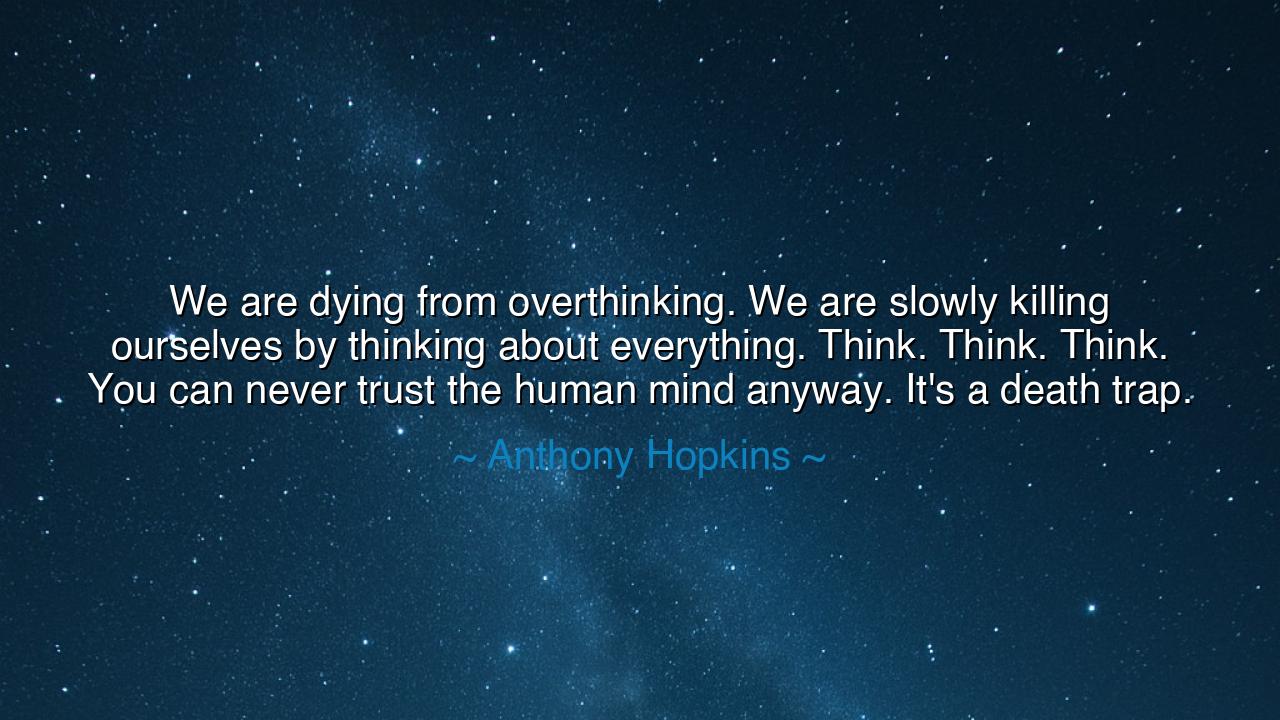
We are dying from overthinking. We are slowly killing ourselves
We are dying from overthinking. We are slowly killing ourselves by thinking about everything. Think. Think. Think. You can never trust the human mind anyway. It's a death trap.






“We are dying from overthinking. We are slowly killing ourselves by thinking about everything. Think. Think. Think. You can never trust the human mind anyway. It's a death trap.” Thus spoke Anthony Hopkins, the great actor and philosopher of the soul, whose long life upon the stage has made him both student and teacher of the human spirit. In these haunting words, he speaks not of death by blade or poison, but of the subtler, slower death that comes from the restless mind—the torment of endless reflection, doubt, and worry. It is a death not of the body, but of peace, a decay not of flesh, but of spirit.
To overthink, as Hopkins laments, is to become one’s own executioner. The human mind, he warns, is both gift and curse—capable of boundless imagination, yet also of endless torment. The mind invents fears where none exist, magnifies wounds that time would otherwise heal, and spins webs of confusion that entangle the heart. Hopkins’s words reflect the wisdom of one who has gazed into that abyss and seen how thought, unchecked, can devour joy. For the mind, when left unguarded, is not a servant but a tyrant—a prison of our own making. And in that prison, we wither, suffocated by our own imaginings.
This truth was known even to the ancients. Marcus Aurelius, the philosopher-emperor, wrote in his Meditations: “The soul becomes dyed with the color of its thoughts.” He meant that our inner world creates the reality we live in; if our thoughts are dark, our lives become shadowed. Buddha too warned that suffering arises not from life itself, but from our attachments—our ceaseless clinging to ideas, judgments, and anxieties. Hopkins, echoing this timeless wisdom, calls our modern affliction by name: overthinking, the disease of an age that has forgotten how to be still. He calls it a death trap, because it ensnares us in illusion—trapping us in thoughts of the past we cannot change and fears of the future we cannot control.
Consider the story of Hamlet, that prince of Denmark, whose tragedy lies not in cowardice but in overthinking. “Thus conscience does make cowards of us all,” he says, “and thus the native hue of resolution is sicklied o’er with the pale cast of thought.” Hamlet’s endless analysis paralyzes his action; his mind, sharp and brilliant, becomes his undoing. He becomes what Hopkins warns against—a man lost within his own thoughts, unable to live. So it is with us: when we think too much, we cease to move, to feel, to trust. The mind’s gift of reflection turns upon itself, like a sword wielded without wisdom.
Hopkins’s insight springs from a lifetime of introspection and artistry. As an actor, he has lived within the minds of kings, madmen, and monsters. He has seen how the mind can build worlds of beauty and terror alike. His words are not condemnation, but caution. “You can never trust the human mind anyway,” he says—not because the mind is evil, but because it is unstable, always shifting, always grasping. It convinces us of falsehoods, feeds us fears, and masquerades illusion as truth. Only when one learns to silence the noise, to listen instead to the heart, to instinct, to presence, can one escape the trap.
To think is necessary, but to overthink is ruin. The wise man uses thought as a tool, not as a home. He wields it like a sword—sharp, precise, and sheathed when not in use. But modern man sleeps with his sword drawn, slashing at shadows of his own making. Thus, Hopkins’s cry is both lament and awakening: that we must learn once again the art of being, not merely of thinking. We must relearn the wisdom of stillness, of silence, of trust in the moment that is, rather than the thousand that might be. For thought can analyze life, but only peace can live it.
So, my child, take this teaching to heart: do not let the mind devour the soul. Think when you must, but rest when you can. When your mind begins to spin its endless wheels, step away from it—walk among trees, feel the wind, breathe deeply until the noise fades. Trust not every voice in your head, for some are echoes of fear, not truth. The ancients taught that wisdom is not the gathering of more thoughts, but the letting go of unnecessary ones. Remember Hopkins’s warning: the mind, unmastered, is a death trap, but the mind at peace is a temple. Guard that temple well. For the measure of a life is not how much one has thought—but how deeply one has lived.






AAdministratorAdministrator
Welcome, honored guests. Please leave a comment, we will respond soon